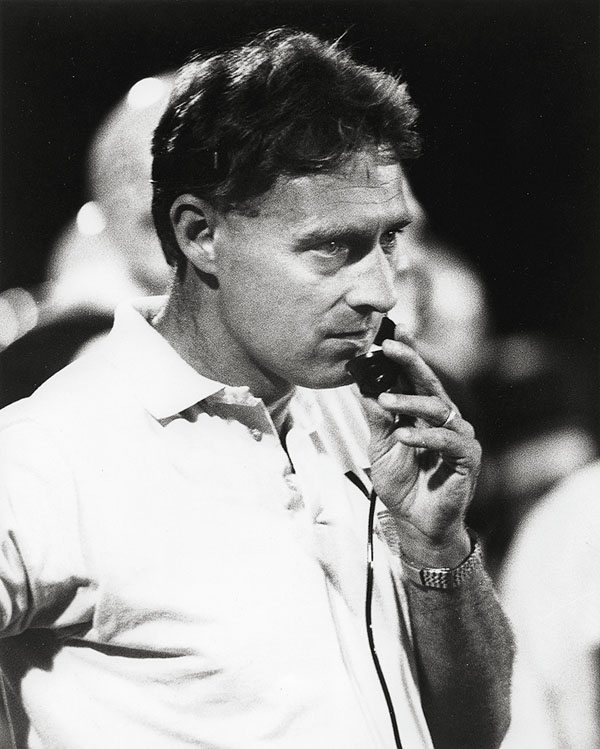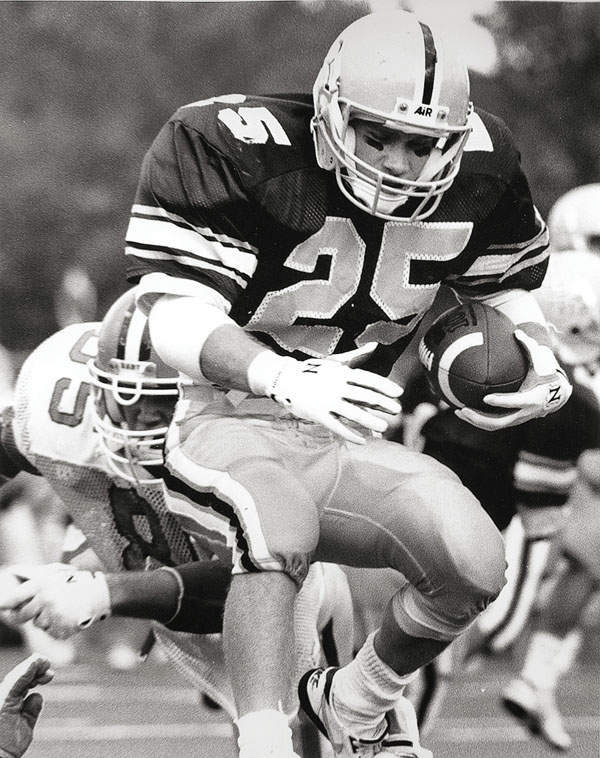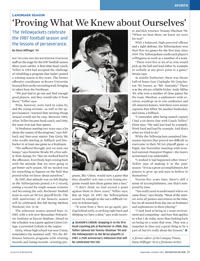In Review
 (Photo: Athletics & Recreation)
(Photo: Athletics & Recreation) SEASON’S CHEER: Stepping in to his first head coaching job at Rochester in 1984, Ray Tellier (above) led Tommy Sheehan ’90 and the Yellowjackets to the NCAA playoffs in 1987, a 25th anniversary milestone that will be celebrated this fall. (Photo: Athletics & Recreation)
SEASON’S CHEER: Stepping in to his first head coaching job at Rochester in 1984, Ray Tellier (above) led Tommy Sheehan ’90 and the Yellowjackets to the NCAA playoffs in 1987, a 25th anniversary milestone that will be celebrated this fall. (Photo: Athletics & Recreation)Ray Tellier and his Rochester coaching staff set the stage for the 1987 football season three years earlier.
A first-time head coach, Tellier in 1984 had accepted the challenge of rebuilding a program that hadn’t posted a winning season in five years. The former offensive coordinator at Brown University focused first on the recruiting trail, bringing in talent from the Northeast.
“We just had to go out and find enough good players, and they would take it from there,” Tellier says.
Wins, however, were hard to come by, and the young recruits—as well as the upperclassmen—learned that turning things around would not be easy. Between 1984, when Tellier became head coach, and 1986, the team won just four games.
“A freshman starting two ways says a lot about the nature of the program,” says fullback and four-year starter Dan Gioia ’88, who recalls starting as fullback and linebacker in at least one game as a freshman.
“We suffered through, and we took our lumps,” says Dominic Strada ’89, a free safety from Jessup, Pa. “But we worked hard in the offseason. Everybody kept coming back with the attitude that we were going to get better each season. All we needed was for something to happen on the field that proved what we knew about ourselves.”
By 1987, that attitude was on full display as the Yellowjackets posted a 9–2 record, setting a record for single-season victories and becoming the only Rochester football team to earn an NCAA playoff berth. The 25th anniversary of the historic season will be celebrated this fall during Meliora Weekend, Oct. 11–14.
The milestone season opened Sept. 12, 1987, with a win over Rensselaer Polytechnic Institute at Fauver Stadium. Ahead on the schedule was a game against Union College, a perennial Goliath in the region.
Gioia, whose high school was near Union, remembers the moment well. “It’s the difference between programs with winning records and losing records—winning programs, like Union, would turn a game that they shouldn't win into a win; losing programs would turn those games into a loss.”
“I don’t think we had scored a point against them in three years,” Tellier says. But on Sept. 19, 1987, the Yellowjackets scored 24, enough to eke out a difficult victory in Schenectady.
“It went from a ‘here we go again,’ getting behind early, to striking right back and thinking we have a shot,” says wide receiver and kick returner Tommy Sheehan ’90. “When we beat them, we knew we were for real.”
With a balanced, high-powered offense and a tight defense, the Yellowjackets won their first six games for the first time since 1959.
The Yellowjackets credit each player’s willingness to work as a member of a team.
“There were five or six of us who would pick up the ball and lead either by example or verbally at any given point in a game,” Strada says.
At middle linebacker, there was future hall-of-famer Gary Ciarleglio ’89. Greg Sutton ’89, known as “Mr. Intensity.” There was the always reliable kicker Andy Milne ’89, who won a number of close games for the team. Sheehan, a sophomore wide receiver, would go on to win conference and All-America honors. And there were senior captains Pete Elliot ’89, another linebacker, and Gioia, a fullback.
“I remember after being named captain I had a sit-down chat with Coach Tellier,” Gioia says. “He said just lead by example. Work hard and lead by example. And that’s what we tried to do.”
While the Yellowjackets sustained late-season injuries that proved too difficult to overcome in their NCAA playoff game—a frigid, late November matchup with eventual national champion Wagner—the team’s turnaround was undeniable.
“I wished it had happened other times,” Tellier says of making it to the post- season. “It was a great accomplishment, for players to grow up and start to believe in themselves.”
Twenty-five years later, there’s still a sense of accomplishment, one that’s tempered by time.
“You really need to understand where we came from,” says Strada. “Most of the starters were all juniors and seniors at the time, but we all started from day one as freshmen and sophomores in there playing.”
“I look back at being in a team environment and competing—and how that applies to what I do today more than looking back on being on a team that won. That was a snapshot in time and a great thing to be a part of, but it’s really about the lessons.”
A former editor of the Campus Times, Dana Hilfinger ’10 is a freelance writer.

